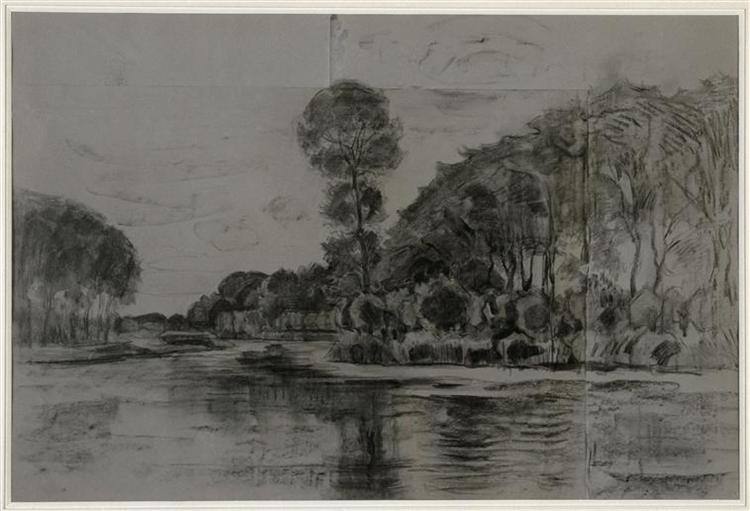Description
The painting "Lonely tree in the gein" (1907) by Piet Mondrian is a work that represents a moment of transition in the artist's career, who had not yet reached the total abstraction that would define it in the subsequent decades. This landscape, which shows a lonely tree in a natural context, is located in the rich tradition of impressionism, guided by a very personal and emotional approach that Mondria was still developing in his work.
The composition of the work is remarkable for its balance and simplicity. The tree stands majestically in the center of the paint, its dark shape contrasting with the softest tones of the background, which are presented in a palette composed mainly of blue and green. This use of color reflects the spirituality that Mondrian began to explore in his work, even before reaching his characteristic style of primary lines and colors. The light seems to be filtered through the leaves, creating an almost ethereal effect that highlights the loneliness of the tree, which seems to surround a wide and empty space that invites reflection.
The choice of a single tree as a visual protagonist is a fascinating point of reflection. This tree is not only a natural element, but it can be interpreted as a symbol of resistance and insulation, referring to the human condition and its struggle in the vast universe. In this context, the tree can also be seen as a precursor to the abstract figures that would explore later in their career, where the shape and color acquire a deep emotional and symbolic meaning.
As for the technique, Mondrian uses a style that is representative of his earliest stage, where deliberate strokes and an almost direct capture of nature can be observed. However, the features that would define their future work are already glimpsed: the simplification of the forms and the search for a purest reality. Although it lacks human figures, painting induces a sense of presence through the shape of the tree, which suggests that there is always a space for personal and internal experience.
Piet Mondrian is known for its evolution towards neoplasticism, an artistic current where it abandoned the representation of the landscape by a structure of straight lines and flat colors, but "solitary tree in the gein" serves as a reminder of its roots in impressionism and its Connection with nature. This work anticipates its interest in harmony and balance that would later materialize in its abstract art.
In his first works of this type, as "trees in the gein" and "people in the gein", Mondrian not only captures the visual essence of their surroundings, but also transforms it through its particular look. Thus, painting becomes a visual manifestation of its artistic process in development and its search for the essential elements of life. This work, although less known compared to its abstract works, gives us an invaluable opportunity to explore the transformation of one of the most influential artists of the twentieth century.
"Solitary tree in the gein" is, therefore, not only a reflection of Mondrian's technical ability, but also of his search for meaning and connection with the natural world. This painting, in its simplicity and depth, invites the viewer to contemplate the beauty of isolation and loneliness, issues that resonate deeply both in human life and in Mondrian's very work.
KUADROS ©, a famous paint on your wall.
Hand-made oil painting reproductions, with the quality of professional artists and the distinctive seal of KUADROS ©.
Art reproduction service with satisfaction guarantee. If you are not completely satisfied with the replica of your painting, we refund your money 100%.

